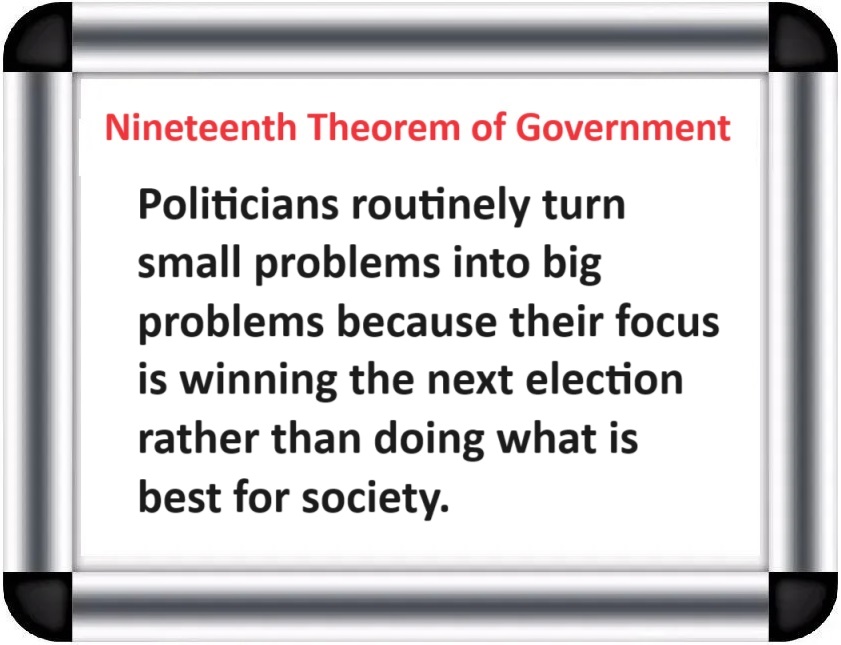In this 12-second video, Margaret Thatcher is talking about the Labour Party in the United Kingdom, but her warning has universal application.
And when I say her warning has universal application, I’m not joking.
Politicians generally can’t resist the temptation to buy votes. And I fear that this can and will happen at all levels of government.
- National governments will run out of other people’s money.
- State and provincial governments will run out of other people’s money.
- Local governments will run out of other people’s money.
There are many potential explanations for why this happens, including demographic change, leftist ideology, and public choice (as described by the 19th Theorem of Government).
I’m sharing this analysis in order to set the stage for a discussion of why left-leaning politicians are being smart in the short run by foolish in the long run.
Regarding the short run, Steven Malanga writes, in an article for the Manhattan Institute’s City Journal, about how left-leaning politicians can enhance their long-run political power by driving away right-leaning voters.
He starts by describing the “Curley Effect.”
In 1973, Coleman Young, an African American former labor organizer with ties to the American Communist Party, ran for mayor of Detroit. Young narrowly beat the city’s police commissioner… Detroit’s crime exploded. Businesses and middle-class residents fled the city… Detroit’s economy and social order collapsed during Young’s two-decade mayoralty. …Yet he kept getting reelected by larger margins… The arc of Young’s mayoral reign—a rapidly deteriorating city combined with ongoing political success—is a strange phenomenon that economists Edward Glaeser and Andrei Shleifer dubbed the Curley Effect, after the early-twentieth-century Boston mayor James Michael Curley. …he remained in power for more than four decades. As with Young years later, Curley’s political fortunes benefited because those most likely to vote against him had left the city.
He then explains that the Curley Effect is making blue states bluer.
…the new tribalism is producing a state version of the Curley Effect. The voters most likely to vote for change are leaving blue states like New York and California, making the Left more dominant in those places and reform increasingly improbable. On everything from energy to taxes and regulation to cultural controversies over illegal aliens and spiking crime, blue-state lawmakers are passing radical bills and voters are electing more progressive politicians. How far can some of these states go? Is a course correction possible? …A UC Berkeley survey, taken just before the pandemic, found that 40 percent of Californians were thinking about leaving the state. That puts California among other strongly Democratic states—including New Jersey, Connecticut, Illinois, and New York—as places where the greatest percentage of the population is considering leaving, polls show. The Berkeley poll quantified responses by political orientation. More than seven in ten Republicans, and 65 percent of the “somewhat conservative,” were considering exiting. …The migration is changing America’s political balance. Blue states are getting more Democratic, even as the party moves further left.
You may already have guessed why this approach is foolish in the long run.
Simply stated, blue states that drive away businesses and taxpayers are killing the geese with the golden eggs. They’re slowly but surely losing the people who pay for government.
The people who stay, meanwhile, are more likely to be the ones who mooch from government.
As illustrated by these two cartoons, that won’t end well.



